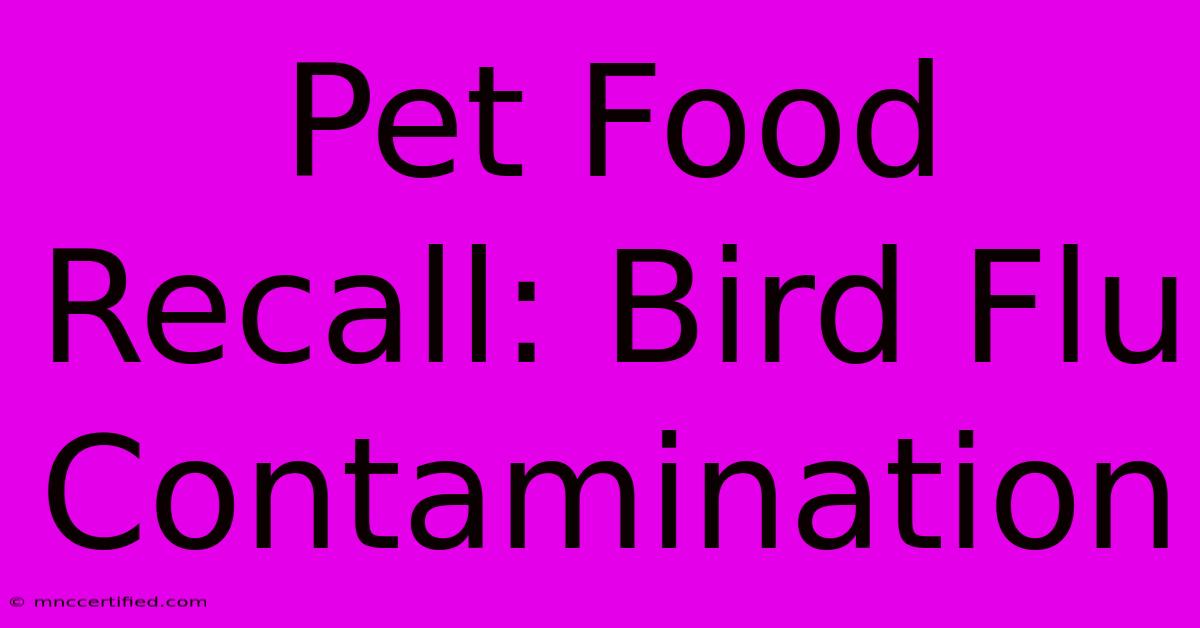Pet Food Recall: Bird Flu Contamination

Table of Contents
Pet Food Recall: Bird Flu Contamination – What You Need to Know
The discovery of avian influenza (bird flu) in pet food has sent shockwaves through the pet owner community. This article will delve into the crucial details surrounding these recalls, helping you understand the risks, identify affected products, and protect your beloved pets. We'll cover everything from identifying contaminated food to understanding the implications for your pet's health.
Understanding the Bird Flu Threat to Pets
Avian influenza, or bird flu, is a highly contagious viral infection affecting birds. While typically affecting poultry, certain strains can pose a risk to mammals, including cats and dogs. The contamination of pet food with bird flu virus raises significant concerns about potential transmission to pets.
The risk of infection isn't solely limited to direct consumption of contaminated food. Indirect exposure, such as through contact with contaminated surfaces or even through pet-to-pet contact, is a possibility. Therefore, understanding the recall details and taking preventative measures is paramount.
Symptoms of Avian Influenza in Pets
Symptoms of avian influenza in pets can vary, but some common signs include:
- Respiratory Issues: Coughing, sneezing, difficulty breathing
- Gastrointestinal Problems: Vomiting, diarrhea
- Neurological Symptoms: Weakness, tremors, seizures
- Lethargy and Loss of Appetite: Significant decrease in energy levels and food intake
If you suspect your pet has been exposed to contaminated food or is exhibiting any of these symptoms, contact your veterinarian immediately. Early intervention is critical for the best possible outcome.
Identifying Recalled Pet Food Products
Several brands have issued recalls in the past due to bird flu contamination. It's crucial to check the official websites of pet food manufacturers and regulatory agencies like the FDA (in the US) or equivalent agencies in your country for the latest recall information. These websites typically provide detailed lists of recalled products, including specific batch numbers and expiration dates.
Don't rely solely on news articles or social media. Always refer to official sources for accurate and up-to-date information. Searching for "[Pet Food Brand] recall" along with your country's regulatory agency will yield the most accurate results.
How to Check for Recalled Products
- Check the packaging: Look carefully at the label for the product name, batch number, and expiration date.
- Visit official websites: Consult the websites of the pet food manufacturer and your country's relevant food safety agency.
- Use online recall databases: Many countries have online databases where you can search for recalled products by brand or product name.
Safe Handling and Disposal of Recalled Food
If you possess any recalled pet food, do not give it to your pets. Proper disposal is crucial to prevent further contamination. The best approach is:
- Double bag the food: Seal it tightly in two plastic bags.
- Discard it responsibly: Follow your local guidelines for hazardous waste disposal. In many areas, this might involve placing it in the trash with other household garbage.
- Clean the area: Thoroughly clean any surfaces that may have come into contact with the recalled food using a suitable disinfectant.
Protecting Your Pets from Bird Flu
While food recalls highlight a significant risk, several steps can minimize the risk of bird flu exposure for your pets:
- Source your food carefully: Buy pet food from reputable suppliers known for their high-quality standards and rigorous safety protocols.
- Monitor your pet's health: Pay attention to any changes in your pet's behavior or health. Early detection is key.
- Practice good hygiene: Wash your hands thoroughly after handling pet food or interacting with your pets.
- Avoid contact with wild birds: Keep your pets away from wild birds, especially if they appear sick or injured.
Conclusion: Staying Informed and Proactive
Bird flu contamination in pet food is a serious concern. Staying informed through official channels, carefully checking pet food packaging, and promptly addressing any concerns with your veterinarian are vital steps in protecting the health and well-being of your beloved companions. Remember to always prioritize responsible pet ownership and seek guidance from veterinary professionals whenever necessary.
Keywords: Pet food recall, bird flu, avian influenza, pet safety, food contamination, pet health, dog food recall, cat food recall, FDA recall, pet food safety, recall information, protecting pets, avian flu symptoms in pets, disposing of recalled pet food.

Thank you for visiting our website wich cover about Pet Food Recall: Bird Flu Contamination. We hope the information provided has been useful to you. Feel free to contact us if you have any questions or need further assistance. See you next time and dont miss to bookmark.
Featured Posts
-
Oklahoma Navy Game 2024 Recap Espn Au
Dec 28, 2024
-
Orange Vs Huskies Holiday Bowl Game Thread
Dec 28, 2024
-
Oklahoma Vs Navy Live Stream Tv Channel
Dec 28, 2024
-
College Football 2024 Upsets Ripple Effect
Dec 28, 2024
-
60cc Big Bore Kit Nihilo For Ktm Husky Gas Gas
Dec 28, 2024